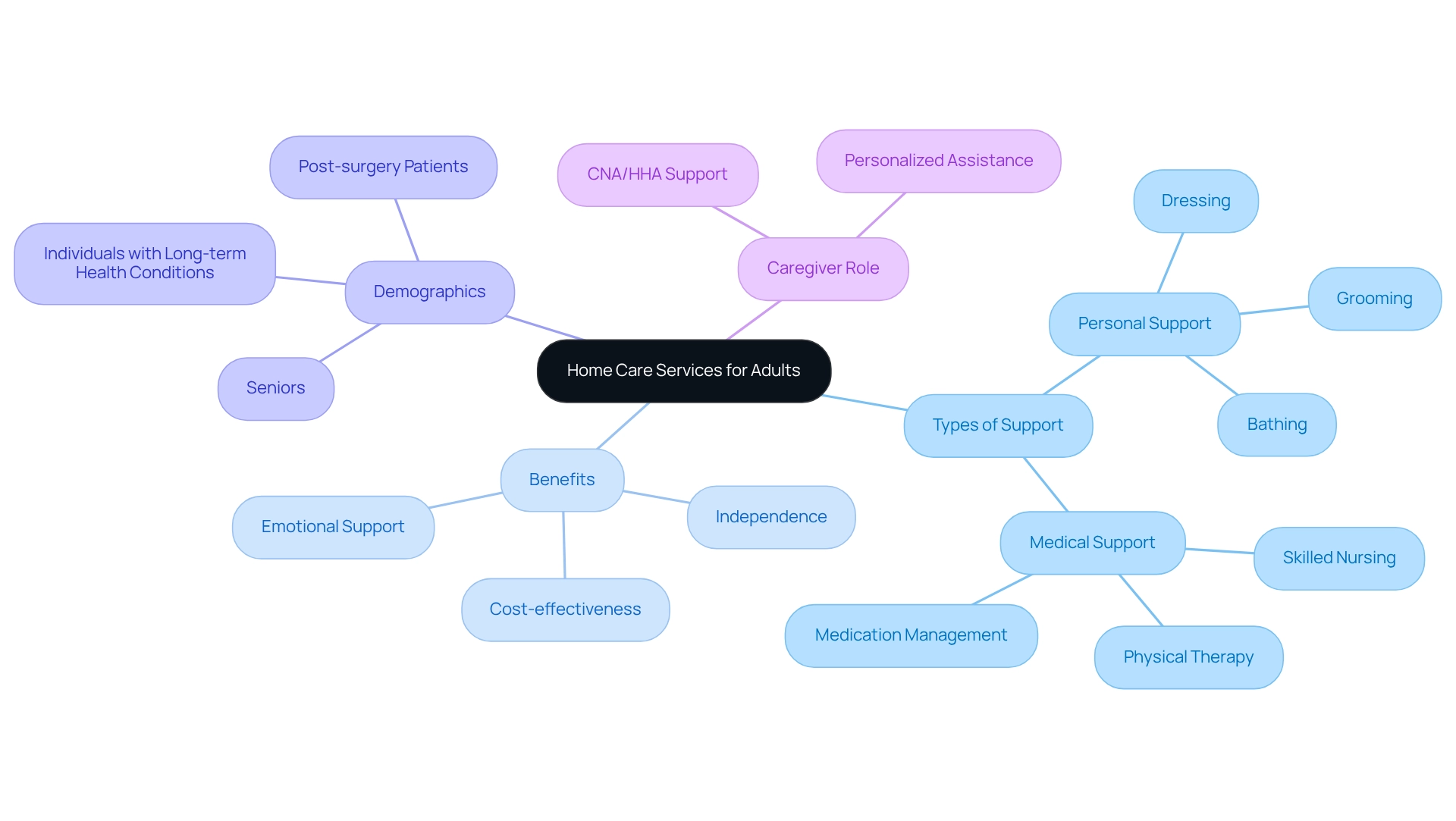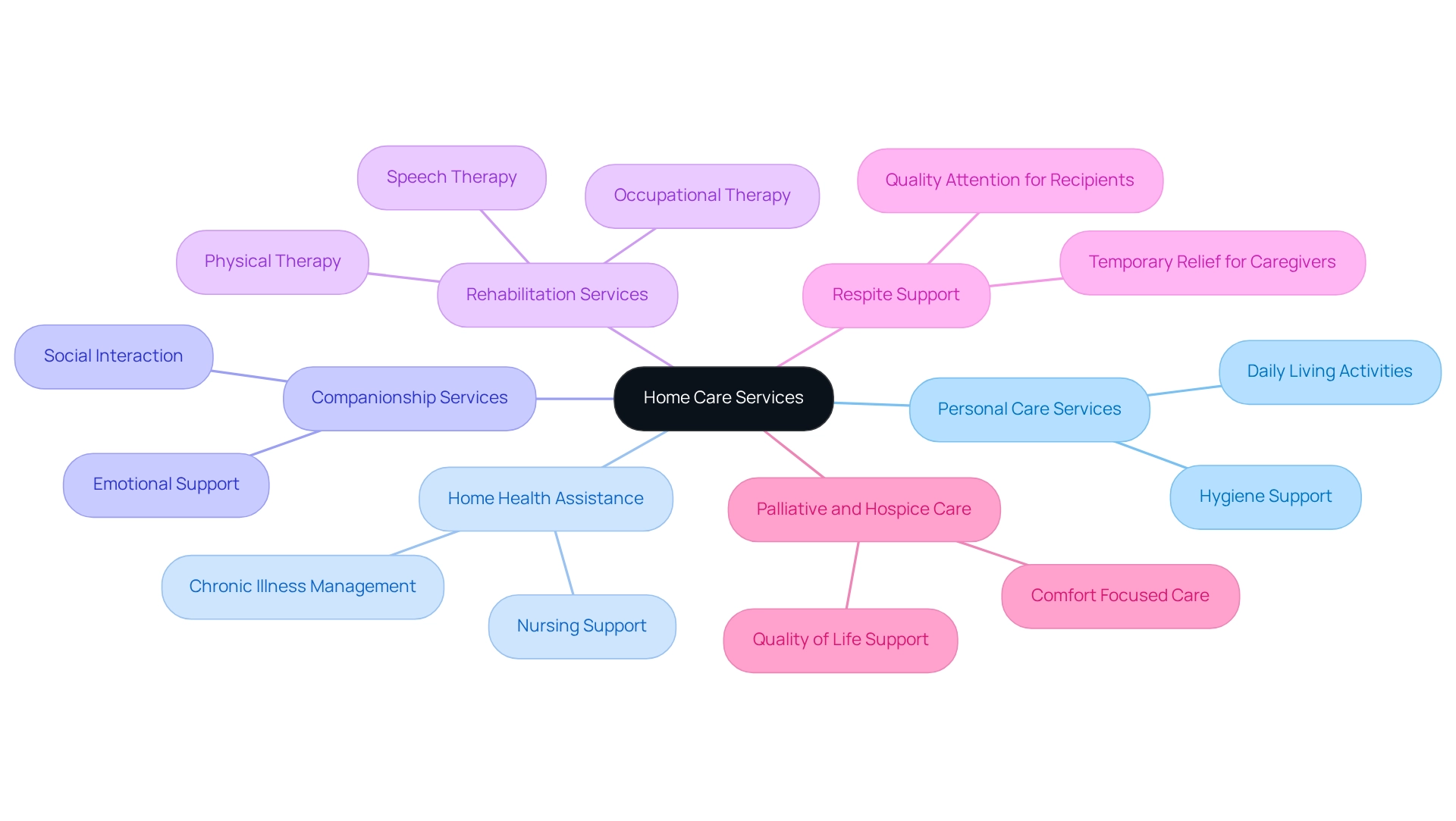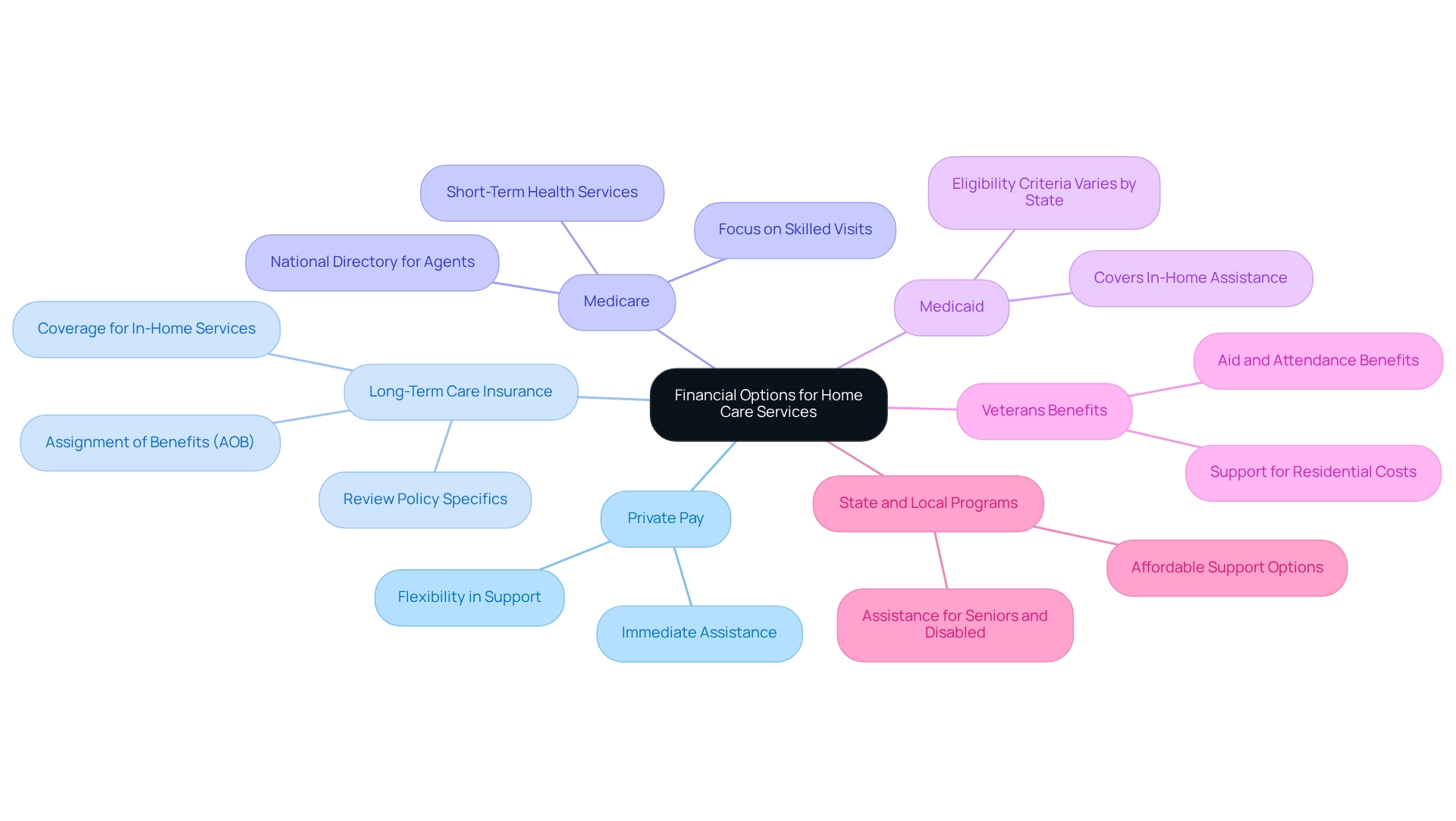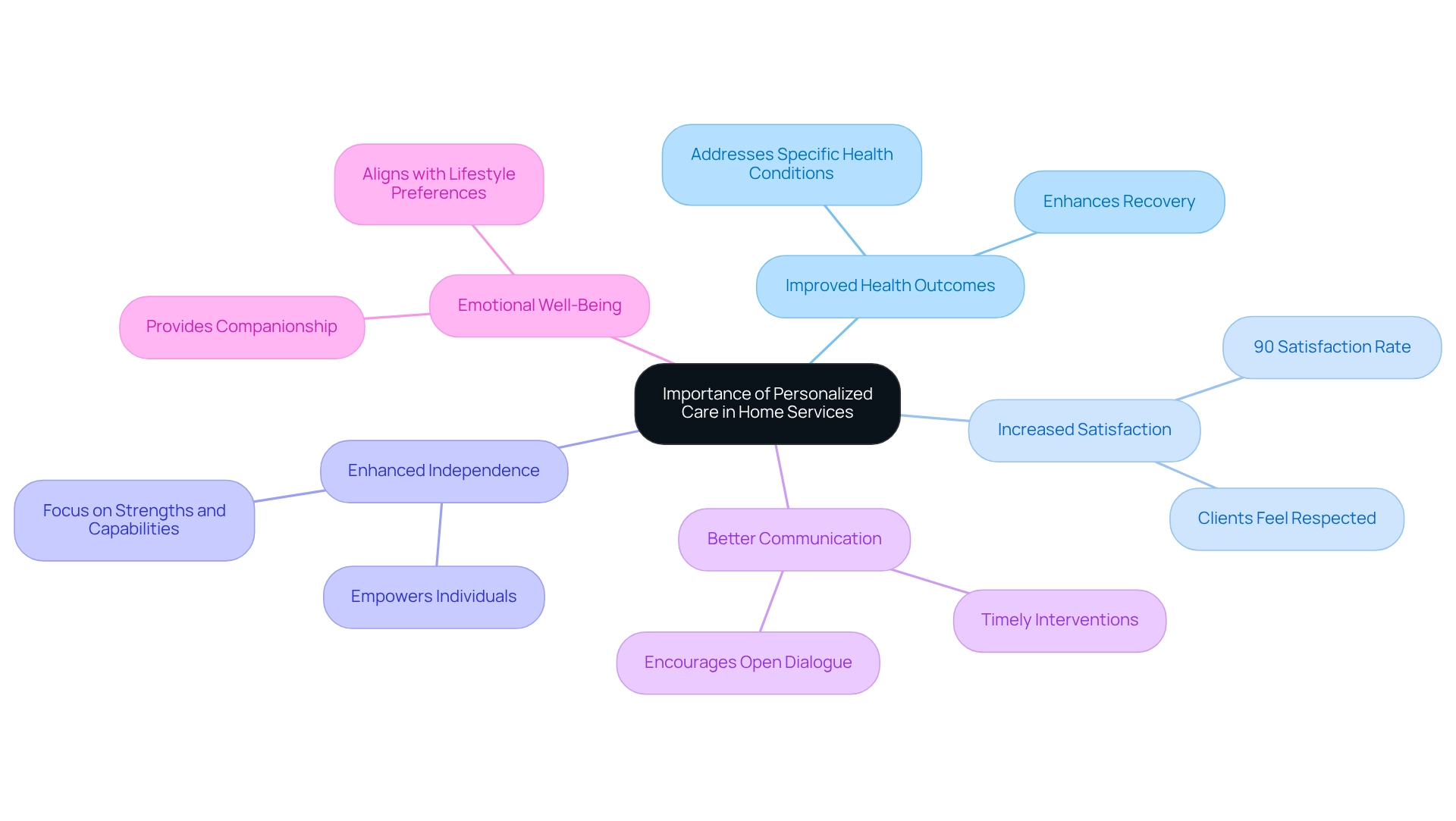Overview
Understanding adult home care is crucial for ensuring that our loved ones receive the support they need. This article explores the various types of home care services available, their costs, and the importance of personalization in these services. Adult home care encompasses a range of support designed to empower individuals to maintain their independence while receiving tailored assistance.
Personalized care not only enhances health outcomes and satisfaction but also addresses the emotional and social needs of seniors. By focusing on individual preferences and circumstances, we can create a nurturing environment that truly supports their well-being.
Are you concerned about how to best support your loved ones? You’re not alone. Many families share similar worries, and that’s why understanding the options available is so important. With the right information, you can make informed decisions that prioritize their comfort and happiness.
In addition, personalized services foster a sense of community and connection, which is vital for emotional health. By choosing the right care, we can ensure that our loved ones feel valued and understood. Remember, your comfort is our priority, and we’re here for you every step of the way.
As you consider the best options for adult home care, think about how personalized support can make a difference. Empower your loved ones to thrive in their own homes while receiving the care they deserve. Together, we can create a supportive environment that enhances their quality of life.
Introduction
In an aging society where many individuals prefer to receive care in the comfort of their own homes, understanding the landscape of home care services is essential. These services, which range from personal care to skilled nursing, are designed to empower seniors and those facing health challenges to maintain their independence while receiving the support they need. As preferences shift towards personalized care solutions, families are increasingly seeking options that not only address medical needs but also enhance emotional well-being.
This article delves into the various types of home care services available, the financial options families can explore, and the critical importance of tailoring care to meet individual needs. Ultimately, it highlights how personalized support can significantly improve quality of life. We’re here for you, and your comfort is our priority as we navigate these important choices together.
Define Home Care Services for Adults
Assistance for adults home care encompasses a wide array of support provided in the comfort of their own homes. This includes personal support, such as help with bathing, dressing, and grooming, as well as medical support that may involve skilled nursing, physical therapy, and medication management. The primary goal of adults home care is to empower individuals to maintain their independence while receiving essential support to manage daily tasks and health needs effectively.
This approach is particularly beneficial for seniors, individuals with long-term health conditions, and those recovering from surgery or hospitalization. It allows them to remain in a familiar environment while receiving personalized care tailored to their unique needs. Home health services not only tend to be more affordable and convenient than institutional options, but they also provide emotional support, addressing the loneliness and anxiety that can accompany aging alone.
Recent trends indicate a growing preference among older adults for adults home care instead of institutional care. The case study titled ‘The Importance of At-Home Preferences’ reveals that most individuals prefer receiving support in their personal residences. This highlights the importance of developing effective adults home care support programs that align with these preferences.
Statistics show that many wartime veterans aged 65 and older may qualify for the Aid and Attendance benefit from the Department of Veteran Affairs, underscoring the financial assistance available for adults home care. By recognizing the diverse needs of this demographic, adults home care services can be organized to provide not only medical help but also emotional and social support, thereby enhancing the overall quality of life for seniors.
Experts emphasize the vital role of CNA/HHA support in delivering personalized assistance, which can significantly improve health outcomes and overall well-being. This enables seniors to preserve their dignity and independence. It also sheds light on the ongoing discussions regarding the complexities and trade-offs that policymakers face when designing residential support benefits that balance generosity with fiscal responsibility.
If you or a loved one are considering home support options, we invite you to reach out to Best Care Nurses Registry at (888) 203-2529. Let’s discuss your needs and explore how we can help you maintain a high quality of life in the comfort of your home.

Explore Types of Home Care Services Available
Adults home care is one of the many home support options that encompass a wide array of choices tailored to meet the diverse needs of seniors and those requiring assistance. These services aim to provide comfort and support, ensuring that every individual feels valued and cared for. Key types of services include:
- Personal Care Services: Offering essential support with daily living activities such as bathing, dressing, grooming, and meal preparation, these services help seniors maintain their dignity and independence. Assistance with personal hygiene is vital for preventing infections and other health issues, contributing to overall well-being. Without these supports, seniors may face health declines, inadequate nutrition, and hygiene challenges.
- Home Health Assistance: Expert nursing support from registered nurses (RNs) or licensed practical nurses (LPNs) meets medical needs, including wound treatment, medication administration, and chronic illness management. This enables seniors to receive essential medical attention in the comfort of their homes.
- Companionship Services: Non-medical support that fosters social interaction and companionship is crucial in alleviating feelings of loneliness and isolation, which are common among seniors. This support significantly enhances emotional well-being, as caregivers provide companionship that can uplift the spirits of those they assist.
- Rehabilitation Services: Physical, occupational, and speech therapy are designed to improve mobility, daily functioning, and communication skills, empowering seniors to regain independence following illness or injury.
- Respite Support: This assistance offers temporary relief for primary caregivers, allowing them to take essential breaks while ensuring their loved ones continue to receive quality attention. As Dr. Stephen Hoag wisely notes, “No matter what the relationship was between the parent and child—whatever it was—this is going to be extremely challenging because it is not logical. There’s no way to deal with it rationally or directly. We always must lead with our love.”
- Palliative and Hospice Care: Focused on comfort and assistance for individuals with serious illnesses, these specialized offerings prioritize quality of life, addressing both physical and emotional needs.
As we look ahead to 2025, the demand for adults home care is on the rise, with statistics indicating that a significant percentage of seniors utilize various home support options. This trend underscores the importance of flexibility and adaptability in service offerings, allowing caregiver services to be tailored to meet the specific requirements and schedules of seniors and their families. Insights from caregivers reveal the emotional complexities of caregiving, highlighting the importance of self-care and the deep bonds formed between caregivers and recipients. These reflections provide valuable context and inspire others navigating similar journeys, emphasizing the significance of compassionate support in enhancing the quality of life for seniors.
To explore customized support options suited to your family member’s needs, please reach out to Best Care Nurses Registry today at (888) 203-2529. Your comfort is our priority, and we’re here for you.

Assess Financial Options for Home Care Services
When considering domestic assistance options, understanding the financial choices available is crucial for families.
- Private Pay: Many families opt to pay from their own funds, which allows for greater flexibility in selecting the level of support that best meets their needs. This option can be particularly beneficial for those who require immediate assistance without the constraints of insurance authorizations.
- Long-Term Care Insurance: These policies often cover a range of in-home assistance services. At Best Care Nurses Registry, we accept most long-term care insurances directly on your behalf. It’s essential to carefully review the specifics of each policy to understand coverage limits and eligibility requirements. Most carriers will require a form known as an assignment of benefits (AOB) to be filled out by the policyholder, enabling you to direct the carrier to pay Best Care directly. With approximately 70% of individuals aged 65 and older likely to need some form of long-term assistance during their lifetime, this consideration is vital for many families. Understanding these regulations can help families prepare for potential extended support needs.
- Medicare: While Medicare typically does not cover long-term residential assistance, it may provide coverage for short-term health services prescribed by a doctor, which can be helpful during transitional periods. Families can search the national online directory for Medicare insurance agents by Zip Code to find assistance tailored to their needs. However, it’s important to remember that Medicare focuses on skilled visits and does not cover activities of daily living, which are provided by private duty caregivers.
- Medicaid: For those who qualify, Medicaid can cover in-home assistance, although eligibility criteria differ by state. This program can serve as a vital resource for families navigating the complexities of long-term support.
- Veterans Benefits: Veterans may be eligible for specific programs that assist with residential support costs, including Aid and Attendance benefits, which can significantly alleviate financial burdens.
- State and Local Programs: Many states offer assistance programs for residential support costs aimed at seniors and individuals with disabilities. These resources can provide essential support for families seeking affordable options.
Understanding these financial pathways is essential for families to make informed decisions about adults home care, ensuring that their loved ones receive the necessary support while effectively managing costs. At Best Care Nurses Registry, we pride ourselves on our strong reputation built over decades, and we are here to help families navigate these options with care and compassion.

Highlight the Importance of Personalized Care in Home Services
Highlighting the Importance of Personalized Care in Home Services
Personalized care is vital in home services, as it ensures that the unique needs and preferences of each individual are met. At Best Care Nurses Registry, we have been offering personalized adults home care in South Florida since 1980, concentrating on expert caregiver matching and insurance support. Tailored care plans can lead to:
- Improved Health Outcomes: Customized care effectively addresses specific health conditions and personal preferences, enhancing recovery and overall health. Research shows that seniors receiving tailored support via adults home care experience significant enhancements in both emotional and physical well-being.
- Increased Satisfaction: When adults home care support is tailored, individuals feel more respected and valued, leading to higher satisfaction levels with the services provided. Statistics indicate that clients express a 90% satisfaction rate when their adults home care services are personalized.
- Enhanced Independence: Tailored support plans in adults home care empower individuals to maintain their independence by focusing on their strengths and capabilities, allowing them to engage in activities they enjoy. This approach not only fosters autonomy but also contributes to a higher quality of life in adults home care.
- Better Communication: A personalized approach in adults home care encourages open communication between caregivers and clients, ensuring that any changes in health or preferences are promptly addressed. This proactive communication can result in timely interventions and modifications in adults home care.
- Emotional Well-Being: Customized adults home care significantly enhances emotional health by providing companionship and support that aligns with the individual’s lifestyle and preferences. Supporters play an essential role in enhancing the quality of life for seniors through adults home care, as emphasized in our dedication to empathetic support. By dedicating time to comprehend our clients personally, we can offer effective adults home care support that improves their quality of life and brings peace of mind to their families.
Step-by-Step Support Planning Process: To ensure individualized assistance within adults home care, we follow a structured approach:
- Initial consultation to discuss requirements,
- Collaboration with healthcare providers to create a customized support plan,
- Referral of compassionate caregivers based on the plan.
Client testimonials reveal that the individualized attention provided through adults home care made all the difference for my mother. The caregivers in adults home care were attentive and truly understood her needs – A satisfied client seeking adults home care.
Call to Action: If you’re ready to explore adults home care options for yourself or a loved one, we’re here for you. Call us at (888) 203-2529 to schedule a consultation today.

Conclusion
Home care services play a vital role in supporting aging individuals and those facing health challenges, allowing them to receive care in the comfort of their own homes. By offering a variety of services—such as personal care, skilled nursing, companionship, and rehabilitation—these services cater to the diverse needs of seniors. This approach not only helps maintain their independence but also addresses emotional well-being, significantly enhancing their quality of life.
Understanding the financial aspects of home care is equally important. Families have multiple options to explore, including:
- Private pay
- Long-term care insurance
- Medicare
- Medicaid
- Veterans benefits
This knowledge empowers families to make informed decisions that align with their financial circumstances while ensuring their loved ones receive the necessary support.
The emphasis on personalized care further underscores the importance of tailoring services to meet individual needs. Customized care plans lead to improved health outcomes, increased satisfaction, and enhanced independence, ultimately fostering a higher quality of life. Our commitment to compassionate care and effective communication between caregivers and clients ensures that each individual’s unique preferences are respected and prioritized.
As the demand for home care services continues to grow, families are encouraged to consider the multitude of options available. Embracing personalized support not only meets medical and daily living needs but also enriches the emotional and social well-being of seniors. By prioritizing comfort and care, families can navigate these important choices, ensuring their loved ones enjoy the dignity and independence they deserve.
Frequently Asked Questions
What types of support are included in adults home care?
Adults home care includes personal support such as help with bathing, dressing, and grooming, as well as medical support that may involve skilled nursing, physical therapy, and medication management.
What is the primary goal of adults home care?
The primary goal of adults home care is to empower individuals to maintain their independence while receiving essential support to manage daily tasks and health needs effectively.
Who can benefit from adults home care services?
Adults home care services are particularly beneficial for seniors, individuals with long-term health conditions, and those recovering from surgery or hospitalization.
What are the advantages of receiving care at home compared to institutional options?
Home health services tend to be more affordable and convenient than institutional options, and they provide emotional support, addressing loneliness and anxiety that can accompany aging alone.
What recent trends have been observed regarding older adults’ preferences for care?
Recent trends indicate a growing preference among older adults for receiving care in their personal residences instead of institutional care.
What financial assistance is available for adults home care?
Many wartime veterans aged 65 and older may qualify for the Aid and Attendance benefit from the Department of Veteran Affairs, which provides financial assistance for adults home care.
How do adults home care services enhance the quality of life for seniors?
Adults home care services provide not only medical help but also emotional and social support, thereby enhancing the overall quality of life for seniors.
What role do CNA/HHA support play in adults home care?
CNA/HHA support is vital in delivering personalized assistance, which can significantly improve health outcomes and overall well-being, enabling seniors to preserve their dignity and independence.
How can I get in touch for more information about home support options?
You can reach out to Best Care Nurses Registry at (888) 203-2529 to discuss your needs and explore how they can help you maintain a high quality of life in the comfort of your home.











